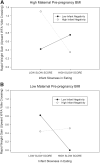Interplay between Prepregnancy Body Mass Index, Early Childhood Negative Temperament, and Slowness in Eating on Early Childhood Rapid Weight Gain
- PMID: 34197210
- PMCID: PMC8818509
- DOI: 10.1089/chi.2021.0024
Interplay between Prepregnancy Body Mass Index, Early Childhood Negative Temperament, and Slowness in Eating on Early Childhood Rapid Weight Gain
Abstract
Background: Early childhood eating behaviors and temperament have been linked to excess weight gain in separate lines of research. However, the interplay among these variables along with maternal prepregnancy body mass index (BMI) in predicting rapid weight gain is poorly understood. Methods: This observational study tested superfactors of early childhood temperament using the Infant Behavior Questionnaire-Revised, and their relationships with eating behavior using the Baby Eating Behavior Questionnaire on rapid weight gain among 9-18 months children (n = 283). The bivariate relationships were evaluated using Pearson correlations. Two-way interactions assessed whether childhood temperament moderated the relationship between childhood eating behaviors and rapid weight gain, with prepregnancy BMI as a higher order moderator. Results: Food responsiveness positively correlated with Negativity [r = 0.256, adjusted (adj) p < 0.001] and inversely with Regulation (r = -0.203, adj p = 0.006). Slowness in eating positively correlated with Negativity (r = 0.196, p = 0.006) and inversely with Surgency (r = -0.188, adj p = 0.008) and Regulation (r = -0.181, p = 0.007). Slowness in eating was significantly correlated with rapid weight gain (r = -0.168, p = 0.005). Prepregnancy BMI was a moderator of slowness in eating and Negativity such that children of mothers with high prepregnancy BMI in conjunction with high Negativity and low in slowness in eating experienced the greatest rapid weight gain, whereas children of mothers with low prepregnancy BMI in conjunction with low Negativity and high in slowness in eating experienced the least rapid weight gain. Conclusions: Assessing early childhood temperament may bolster health care and parenting interventions to increase early eating regulation and to promote healthier weight trajectories.
Keywords: early childhood appetite; negativity; obesity; rapid weight gain; slowness in eating; temperament.
Conflict of interest statement
No competing financial interests exist.
Figures

References
-
- Llewellyn C, Wardle J. Behavioral susceptibility to obesity: Gene-environment interplay in the development of weight. Phys Behav 2015;152:494–501. - PubMed
-
- van Jaarsveld CHM, Llewellyn CH, Johnson J, Wardle J. Prospective associations between appetitive traits and weight gain in infancy. Am J Clin Nutr 2011;94:1562–1567. - PubMed
-
- Kong KL, Anzman-Frasca S, Feda DM, et al. . Infant temperament is associated with relative food reinforcement. Child Obes 2016;12:411–417. - PubMed
Publication types
MeSH terms
LinkOut - more resources
Full Text Sources
Medical

